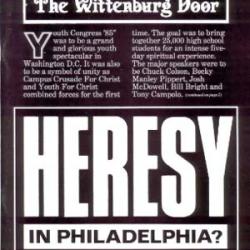Both Patrick Nielsen Hayden and tristero have noted the post-election sermonette from Jim Wallis in which he claims that Tuesday was somehow "A defeat for the religious right and the secular left."
In this election, both the Religious Right and the secular Left were defeated, and the voice of the moral center was heard. …
It is clear from the election results that moderate, and some conservative, Christians — especially evangelicals and Catholics — want a moral agenda that is broader than only abortion and same-sex marriage. Various exit polls showed a shift of 6 percent to 16 percent fewer evangelicals and Catholics supporting Republican candidates than in 2004. Poverty, the war in Iraq, strengthening families, and protecting the environment are all moral values. And many Americans this year voted all of their values.
Ugh. Jim's intent here seems to be his usual riff, trying to convince "conservative Christians — especially evangelicals and Catholics" to embrace a "broader" moral agenda than the usual questions of genital politics. That's a worthy effort, and Jim has my gratitude and respect for his decades-long faithfulness in pursuit of it (although I reserve the right to disagree with his assumption that conservative Christians are right about those genital matters).
The problem here comes from his decision that this argument for a broader moral agenda would be more persuasive with a bit of Dick-Morris style triangulation, using a strawman "secular Left" as his whipping boy.
In response, let's turn to today's first Gospel reading, from Mark 9:
"Teacher," said John, "we saw a man driving out demons in your name and we told him to stop, because he was not one of us."
"Do not stop him," Jesus said. "No one who does a miracle in my name can in the next moment say anything bad about me, for whoever is not against us is for us."
Poor John. "We told him to stop, because he was not one of us." Brilliant move, that. It shows what comes of treating Jesus like a brand name — you end up siding with the demons.
Jesus is all about driving out demons, healing the sick, feeding the poor. Yet somehow his followers, like John and Jim, tend to forget that this is what matters most. We see others doing this same work and we start defending our turf. We start acting like corporate attorneys, filing cease and desist orders to protect the brand name or to try to collect some kind of franchising fee. We see people who are "not one of us" doing good and, perversely, we tell them to stop.
Jesus isn't interested in franchise fees. He's interested in casting out demons. If someone else outside of our little clique decides to pitch in, "Do not stop him," Jesus says. "Whoever is not against us is for us."
Some might read this story, with it's refrain of works done "in my name," and decide that it still offers some defense for parochial ownership of good works. Those bogeymen of the "secular Left," after all, aren't doing good in Jesus' name, so maybe it's OK to tell them to stop.
If anybody wants to go there, I'd refer them to today's second Gospel reading, this one from Matthew 25. This is Jesus talking:
"Then the King will say to those on his right, 'Come, you who are blessed by my Father; take your inheritance, the kingdom prepared for you since the creation of the world. For I was hungry and you gave me something to eat, I was thirsty and you gave me something to drink, I was a stranger and you invited me in, I needed clothes and you clothed me, I was sick and you looked after me, I was in prison and you came to visit me.'
"Then the righteous will answer him, 'Lord, when did we see you hungry and feed you, or thirsty and give you something to drink? When did we see you a stranger and invite you in, or needing clothes and clothe you? When did we see you sick or in prison and go to visit you?'
"The King will reply, 'I tell you the truth, whatever you did for one of the least of these brothers of mine, you did for me.'"
Jesus commends "the righteous." What makes them "the righteous"? They fed the hungry, welcomed the stranger, clothed the naked, cared for the sick and imprisoned. And — this is explicit — they had no idea who this Jesus guy was. "I was hungry and you fed me," Jesus says. And the righteous say, "I'm sorry, have we met? We fed a lot of hungry people, but your face doesn't ring a bell …"
Jim Wallis is correct that, "Poverty, the war in Iraq, strengthening families and protecting the environment are all moral values." But he's wrong to imply that only those with a particular religious brand name can legitimately hold such values.
Jim's clumsy triangulation is disingenuous. He knows better — he has worked in ecumenical and interfaith coalitions, and in partnership with secular saints of every stripe. He has done a lot of good, working alongside others who have also done a lot of good — people who share his commitments to peace and justice and all that stuff but who don't necessarily share his particular sectarian motivation for those commitments.
I get that this can be confusing at first for those of us who share a particular religious motivation. You set yourself to the task because the Bible Says So, or because you're trying to obey Jesus, or because you love Jesus, or because you're so filled with Jesus' love that you can't help but share it with others (that's intended as a progression). And then you find yourself working shoulder-to-shoulder with people who have never given Jesus a second thought.
"So if you don't share my particular motives," you ask your new partners, "then why are you here?"
"Funny," they say. "I was about to ask you the same question."
Confusing at first, but then exhilarating. And liberating. And empowering. There is, after all, a lot of work to do, and unexpected allies should always be welcome.
They're driving out demons. They're feeding the hungry, welcoming strangers, clothing the naked, caring for the sick. They're good people — "the righteous." Do not stop them. Whoever is not against us is for us.
UPDATE: The above is mainly a response to Jim's goofy triangulation — religious progressives trying to court religious conservatives by echoing their condemnation of the supposed "secular humanist" conspiracy — but the other premise of his piece, the supposed swing of evangelical and Catholic voters, isn't factually true either. Kevin Drum sums up the reality:
In the the overall national vote, Democrats picked up 5 percentage points compared to 2004.
Among Catholics they picked up 6 points.
Among weekly churchgoers they picked up 3 points.
Among white evangelicals they picked up 3 points.
There's just no story here unless you look at individual races. Nationally, turnout among religious voters was as high as it was in 2004, and their shift toward Democrats was either the same or a bit less than the overall national shift. I'd love to be able to say that Democrats made some disproportionate inroads in this group, since it's such an important part of the GOP base, but they didn't. People need to quit saying it.















